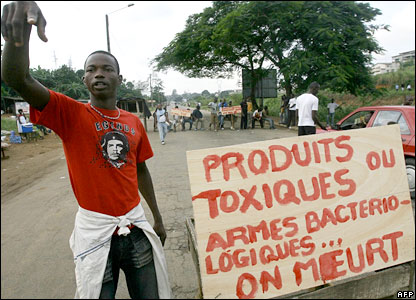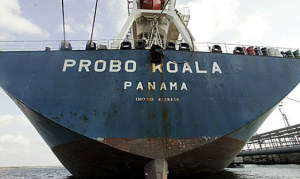Hazardous waste dumping in developing countries

By Brian Mackay
Historically, crimes against the environment have persistently occurred, leaving the ecological global system devastated. Although all are extremely demoralizing, some of the most distressing environmental crimes consist of pollution and hazardous waste offenses. One of the most immoral and damaging offenses of this nature occurred in 2006 off the coast of Abidjan in Cote d’Ivoire, a West African country located on the Ivory Coast. Trafigura, the worlds third largest independent oil company located in the United Kingdom, had dumped over 250 tons of hazardous waste off the coast of Abidjan. This specific case is unique when considering that various perspectives in regards to environmental crime are present, which include conventional, ecological and corporate viewpoints.
As a fairly new topic of interest, environmental crime can be defined utilizing various perspectives that are outlined by identifying issues concerning the victims that are being harmed. The conventional perspective addresses crimes that violate specified laws and human rights, while the ecological perspective discusses the relationship between humans and the environment. In my opinion, corporate environmental crime is the most obvious when applying this example and can be defined as crime that results from routine activities amongst prosperous corporations in pursuit of economic gains. In recent years, many examples of environmental crime can be displayed violating each of these proposed perspectives individually, but few present the ability to portray them collectively and present multiple issues in regards to global governance and international law.
The transportation and disposal of hazardous waste has been an international issue of concern for decades. Non-governmental organizations have reported that over 8.5 million tons of waste is transported and traded annually. Trends have also been identified that support a relationship between emerging global economic markets and hazardous waste dumping in poor indigenous countries. It has also been true that most of today’s global waste production has occurred in developed countries and has been transported into developing countries, thus promoting the idea that developing countries have become hazardous waste dumping grounds. Both governmental and non-governmental agencies have supported this claim by confirming reports of hazardous waste in locations all over Sub-Saharan Africa.
The dumping of hazardous waste off the coast of Abidjan by Trafigura is probably the most obvious and devastating crime of this nature in the past century. In August of 2006, the citizens of Abidjan woke to the smell of toxic waste that had been dumped off the coast. The waste had been illegally exported from Europe on the Probo Koala, and illegally dumped off the coast. Greenpeace and Amnesty Internationally reported that more than one hundred thousand people were affected and treated for numerous injuries to include eye injuries, breathing difficulties and nausea. It was also reported that 15 people had been killed as a result of effects from the hazardous waste. Tests had shown that the waste contained high amounts of caustic soda, mercaptans, hydrogen compounds and sulfur. Taking a conventional approach, it is obvious that Trafigura violated both the human rights of the citizens and the environment, thus causing excessive ecological and individual damage.

When considering corporate environmental crimes, it is obvious that the company deliberately acted in pursuit of economic gains. Trafigura had turned down multiple countries that had the ability to dispose of the waste properly. The Netherlands had offered to dispose of the waste safely for three hundred thousand dollars. This offer was denied due to the desire to obtain ultimate profits and economic advantage. Cases such as this have become very prominent when considering the relationships between industrialized countries and developing countries. Developing countries have been the subjects of many hazardous waste crimes due to the profits that can be obtained by both the country and the corporation. This is the unfortunate truth in today’s global society due to the economic competition that persistently exists.
An amendment to the Basel Conventions has been proposed that would ban the transportation of hazardous waste from developed countries to non-developed countries. It can be concluded that this is a step in the right direction, but results have not been forthcoming due to the lack of enforcement through the international community and the existence of non-compliant behavior. I would argue that forceful global governance is needed in order to deter future criminal activity. These issues need to be addressed immediately in order to ensure that cases involving the dumping of hazardous waste do not continue to persist in the future.
 Brian Mackay spent seven years in the New York Air National Guard as an aircraft Loadmaster, completing three years of active duty service. He is currently a Graduate student studying International Crime and Justice at John Jay College. His primary interests within the field include international and transnational organized crime and global drug trafficking.
Brian Mackay spent seven years in the New York Air National Guard as an aircraft Loadmaster, completing three years of active duty service. He is currently a Graduate student studying International Crime and Justice at John Jay College. His primary interests within the field include international and transnational organized crime and global drug trafficking.